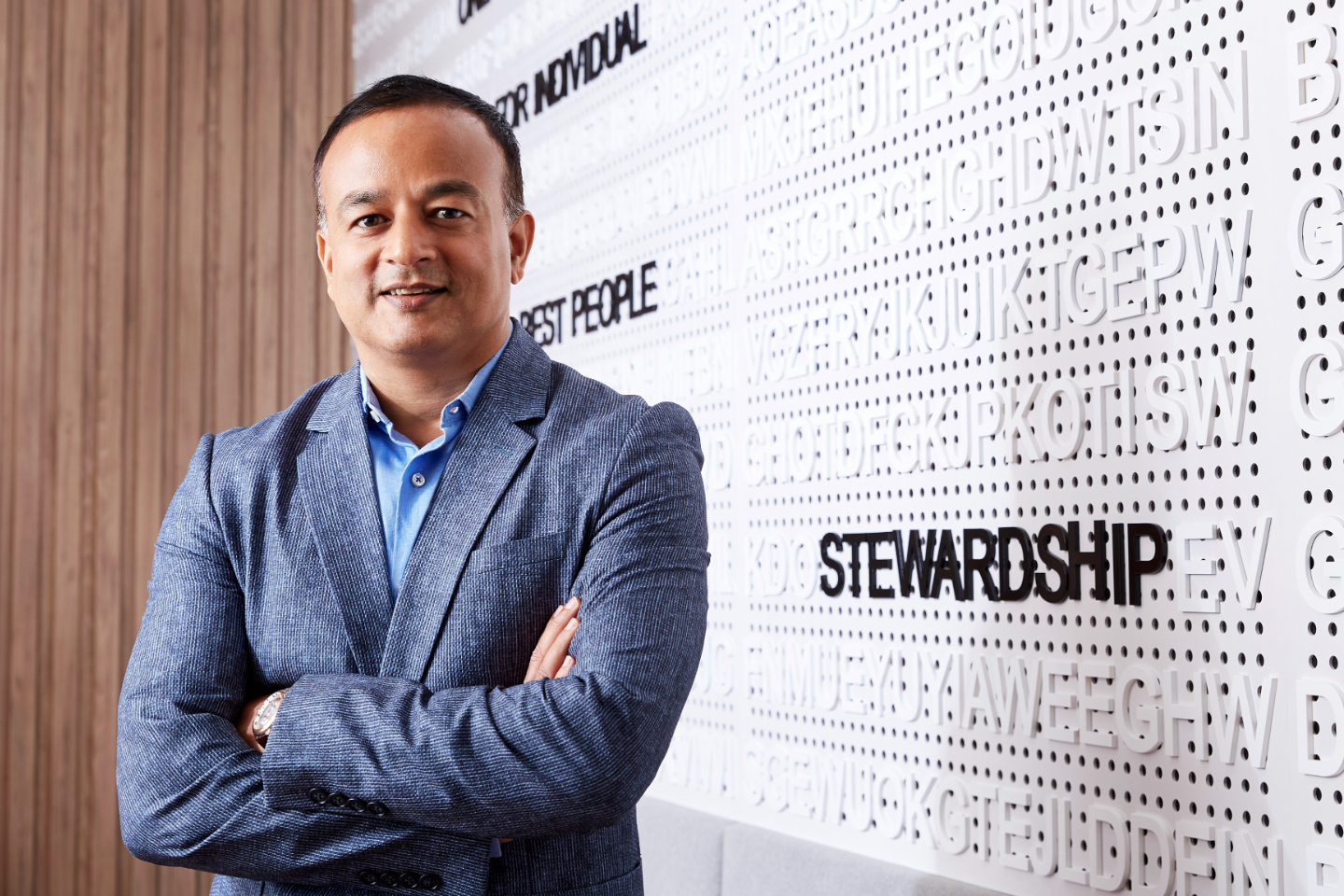
“At its most basic, marketing is about life,” he says (Photo: Soophye)
The nature of change in the last 20 years is so fundamental that the future needs to be reconceived from a white sheet. While you are at it, leave some intergenerational baggage behind and think afresh. To gain a foothold in the future, be like a digital native to fathom how consumers behave today. To hook them and stay relevant, reconsider marketing strategy because data and technology have transformed what works in the marketplace.
These are takeaways from Made in Future: A Story of Marketing, Media, and Content for Our Times by Prashant Kumar, founder of Malaysia-based Entropia. The next-generation marketing services consultancy was acquired in June 2021 by Accenture Interactive, which rebranded as Accenture Song in April this year.
Prashant, now head of communicate, SE Asia for Accenture Song, says the definite article “the” is deliberately missing from his title to emphasise a point. “People see the future as a definitive, an absolute. I don’t. I see it as a forever evolving, shape-shifting organism. Hence, ‘Made in Future’. It’s also the spirit behind my starting Entropia.”
Radical changes have disrupted the media landscape and consumption patterns. When charting a brand’s path forward, intergenerational baggage can be both a boon and bane. It is useful in that it brings a certain depth and wisdom to the way we live. But it can sometimes be a trap too, and this digital leader explains why.
A lot of those laden by such baggage assume by default that digital reality has a junior status to physical reality. “But if people are spending 80% of their waking hours working, studying, shopping and entertaining in digitally mediated spaces, who is to say these are any less real than what you do in the physical world? That is the whole prospect of what the metaverse represents.”
made_in_future_by_prashant_kumar.jpg
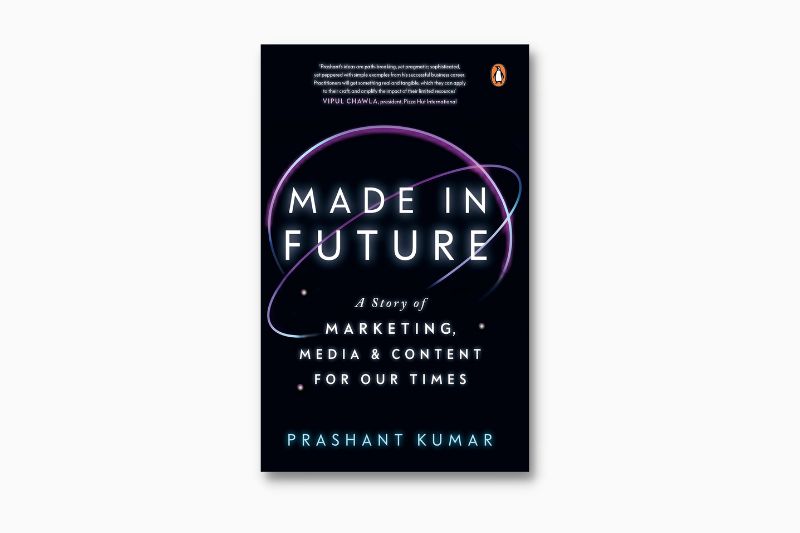
The best balance is to retain that sense of continuity and yet be able to see things from a fresh, pragmatic perspective, Prashant thinks, framing the content of Made in Future, which is neither about technology nor a latent criticism of the past. It is a forward story about marketing strategy in the new age and shows, through research and multiple case studies, how marketers, media owners, agencies and content creators must toss out rules from the 1990s and adopt a new view of marketing to understand what consumers want now.
“You cannot fit the future into the containers of the past,” says the author. It is an exercise in futility that he likens to using Band-Aid to fix a broken model.
When asked what marketing mindset has to be jettisoned, Prashant uses the simple right-brain, left-brain analogy to elaborate. In traditional organisations, marketing sits at the right end of the spectrum, with technology and IT on the opposite end, and the twain did not meet.
“But in the times we live in, the two have to come together,” he says, and points to Steve Jobs as a good example of an entrepreneur who tapped that connection. “He got his inspiration for Apple from calligraphy. He realised technology does not have to be ugly, and utility does not have to be a zero-sum game with beauty.”
Form need not be compromised for function, or vice versa, Prashant believes. Both have met and revolutionised design as a discipline in the last 20 years.
Technology comes into play increasingly, with people wanting to live life as a series of “S” curves, pivoting at work, moving homes, setting out in search of adventure or learning completely new things.
“People are trying to squeeze more life into every moment and living in multiple attention states,” Prashant observes. Living more lives within one lifespan can induce a tremendous amount of complexity and he sees technology helping to make things simple.
Fail-fast culture needs to become part of the DNA of more businesses as well, with start-ups leading the way in innovation in various areas. Nowadays, a company does not have to wait for a finished product to hit the market. Executives can roll it out and gather customers to evolve and improve it. Customers love that; they want to be part of the product evolution. Data and technology can enable that, but first, there has to be a change by way of mindset.
20220714_pla_accenture_new_office_16_msy.jpg
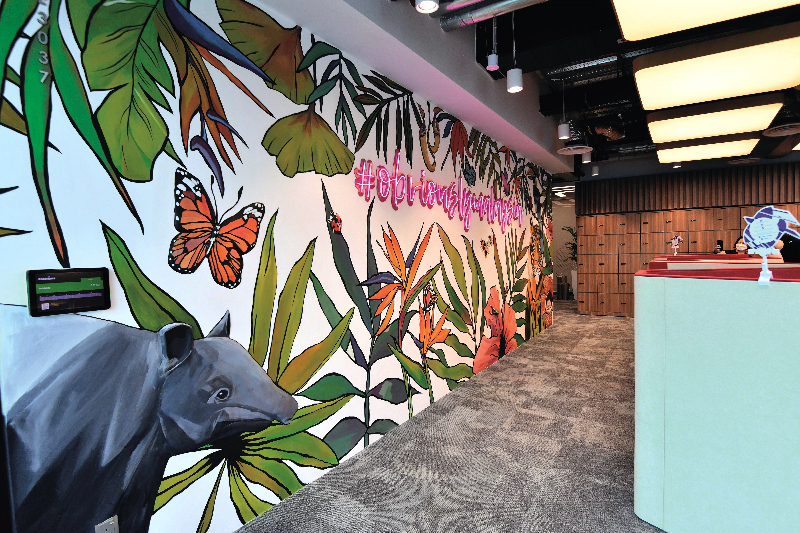
Made in Future distils Prashant’s learnings and experiences across corporations, both local and foreign blue chips, and from years of working with hundreds of brands.
“At its most basic, marketing is about life,” he says. “At Accenture Song, we talk about life-centric all the time because we believe the biggest struggle businesses, almost every business, face today is how to stay relevant to people in these fast-changing times. Unless we have relevance, we cannot unlock the next level of growth.”
Companies that do not want to stagnate must tap their inner empathy, ingenuity and creativity. When they understand the whys, they can conceive the why-nots. And when they are able to connect with people at a certain not-so-shallow level, they gain the ability to think about universal ideas that can be used in marketing, and which people are willing to pay for.
“All returns in any business are ultimately the return on customer empathy. It’s our most important value proposition for clients,” he shares.
Empathy, combined with ingenuity, are defining forces that enable businesses to continue growing and be relevant. Empathy is the continuous line between his spiritual understanding and his profession, says Prashant, who admits to not being a spiritual person, in the conventional sense of the word, but “I understand why people need gods”.
Emphasising his belief that marketing is to business what empathy is to the human society, he relates how someone asked a famous archaeologist the oldest evidence of civilisation she had encountered. Her reply: a human skeleton with a broken leg bone that had healed.
In the forest, when animals break their leg, they simply die because they cannot hunt and no one can bring them food or water, or protect them from predators and the elements. Here was a human who had broken a bone and somebody took care of him or her for a long period of time, he stresses, obviously amazed when he retells this story.
“Empathy is the god particle of society. That is why we humans are so incredibly powerful, resourceful and successful as a species.”
20220714_pla_accenture_new_office_12_msy.jpg
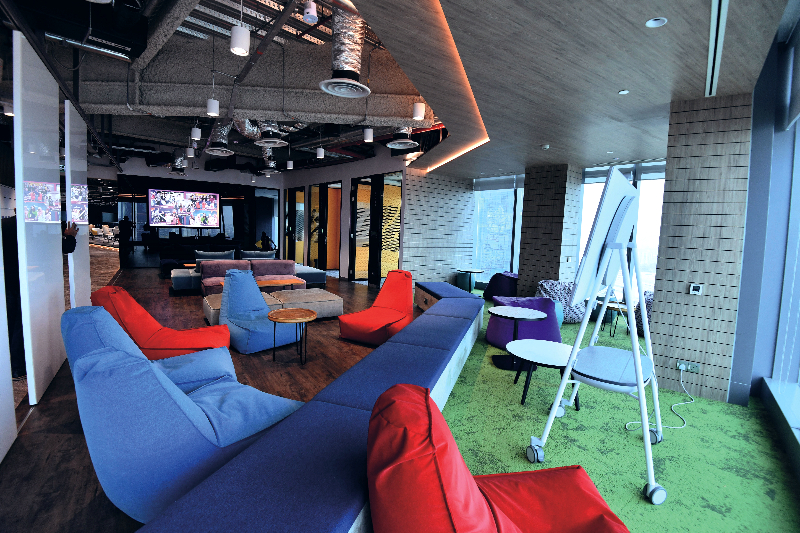
Prashant includes a Glossary of the Future that explains words he frequently uses in his work. Three jump out: “marselling”, coined from marketing and selling, the lines between which have blurred; “momentness”, the quality of being relevant in the right moment; and “texperiential”, which relates to specific experiences made possible by new technologies.
Before, people watched TV advertisements on Thursday and visited the supermarket on Saturday and remembered what they saw and wanted. Now, one click separates media and shop.
“Both must merge into one marselling discipline because, ultimately, marketing is about influencing the human experience. As such, it makes sense to manage that total experience in a seamless way.”
Momentness ponders questions that impact, for example, editorial and marketing decisions: Who are your readers? When do they read your paper? Who are they with? What are they doing while reading? What’s their mood like on a Saturday morning versus during a 20-minute ride to the office on Monday? Are they looking for dive or dwell content? It is crucial for organisations to understand what moments they want a share of, he thinks.
Asked who will be the next big disruptor, Prashant says Elon Musk, the founder-cum-CEO of Tesla and rocket manufacturer SpaceX, has a couple of cards up his sleeve. The technology is in place to put man on Mars by 2030 and there is a system behind that goal now, with Blue Origin on board. mRNA-based Covid-19 vaccines will revolutionise healthcare by heralding the era of genetic medicines. Artificial intelligence, or AI, and genetics are a whole another field, as is blockchain.
“Who knows, companies we have never heard about may spring up in the next 10 years in these areas,” he muses.
Entropia did that, gaining attention as one of the top communications and digital companies in the region soon after its founding in 2016. In 2020, it was recognised as the third fastest-growing large agency in the world by Adweek, New York, with clients such as PepsiCo, Nestlé, BMW, Unilever, Petronas, Tenaga Nasional Bhd, Foodpanda and Grab. Entropia was New York-listed Accenture’s first acquisition in Southeast Asia.
caption_from_left_azwan_baharuddin_country_managing_director_accenture_malaysia_with_prashant_kumar_founder_and_senior_partner_entropia.png
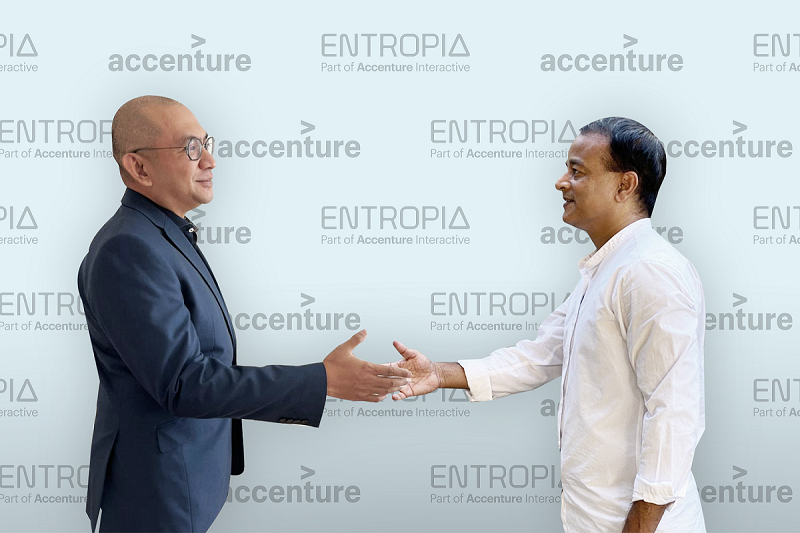
Prashant created waves too, earning recognition as one of the five digital marketing thought leaders globally by the International Advertising Association in 2019. Born in a small town in India, he studied in an army school before proceeding to St Stephen’s College Delhi, MICA Ahmedabad and Harvard Business School. While in college, he had the option to join one of the big accounting firms but felt the job was not for him. Upon graduation, there were two other choices — become a journalist (he was editor-in-chief of his college yearbook) or go into marketing.
As journalism did not pay well in India those days, he decided on advertising, a good balance between making money and doing something different.
“Somewhere deep inside that whole appreciation for creativity was probably a subconscious excitement about people, how they think and behave, what matters to them. It goes back to empathy,” Prashant says.
At 36, he became president of IPG Mediabrands Asia overseeing US$3.8 billion in billings. “IPG was an amazing company and I had a good time” but the prospect of continuing for another five years was boring. So, after turning 40 and feeling “a bit of a mid-life crisis” and the desire to begin a new S curve, he took a leap of faith and launched Entropia. His vision was to bring human experience and the ability to engineer organisations and business and finance together in one seamless thinking.
Asked why he joined Accenture Song, Prashant says it is for the same reason people love horror movies: “The resolution is in the thrill, and the gratification is the thrill.” Becoming part of the world’s largest digital agency was a trade between his highly specific personal perspective and a platform with scale, and he uses a speedboat and an aircraft carrier to elaborate.
“With a speedboat, you can go wherever you like, compared with an aircraft, in which you need to synchronise what you do with a thousand other people. But what you get in return is incredible power and the scale. We make that trade all the time in our life, like when two people marry. Civilisation teaches us to lock steps with a whole lot of humans.
“At Accenture, it is not enough to be a bedrock; you have to be a beacon. Bedrocks are big and solid but opaque and static, they don’t respond. Beacons inspire, are visible, transparent and there is a certain dynamism attached to them.”
Bedrock reflects his father’s relationship with him, whereas he tries to be a beacon for his two sons. “I try to cue, inspire, subtly guide and maybe they will make up their minds. It’s the same relationship that has developed between brands and customers.”
Accenture Song is designed around life and human experience, which goes back to dialling up relevance as the biggest challenge businesses face today and he believes life-centricity is key to unlocking the next level of growth for almost every business. “What use is a business if it does not directly or indirectly enhance user experience? It has no reason to be unless it creates value for customers.”
The company’s new name delights him because song is the oldest human form of communication. “We learnt to sing from birds and told our earliest stories through song. It is versatile, universal — everyone has their own song — and it’s also personal. Ultimately, it’s about human experience.”
Any plans for a second book? “It has taken me years to distil what I know into this one. It should take several years before my next,” says Prashant, who says he has always been a better reader than writer. A tremendous respect for the written word had him ending up critiquing himself very harshly.
“I never thought I would be able to write a book as daily life is so fragmented, with so much going on. To be able to sit peacefully and collate a book was not easy.” But stuck at home when the pandemic hit, he wrote daily for close to four months, completing the first draft fast to get “a continuity and integrity between the chapters and a certain personality that carries through from start to end”.
Revisions, of which he did several rounds, were the toughest. “In many parts, it’s a very edgy book and lots of perspectives are my own. So only I could have done the rewriting post-feedback,” says Prashant, who enjoys the works of Fyodor Dostoevsky (he read Crime and Punishment three times and cried twice), Salman Rushdie (his earlier books, especially Midnight’s Children and Shame) and Ernest Hemingway, who whisks him to a whole new world. Gabriel García Márquez is one of his all-time favourite writers. “When I visited his house, it was like a pilgrimage for me.”
He reads when free, or goes for walks with his sons. “I take them wherever they want to go, have conversations along the way, pass on some wisdom, steer them towards my hidden agenda, trying to father. They’re definitely smarter than I was at their age, with more diverse experiences.”
There has been a significant increase in people having a width of experiences, he says. But depth has gone down, replaced by diversity, notes this marketing expert. That is fine, as long as they do not lose their ability to dive once in a while. “That is a skill we must leave our children with. They must be able to play with different modes of life. Hook some, dwell some, dive some.”
This article first appeared on Oct 17, 2022 in The Edge Malaysia.


